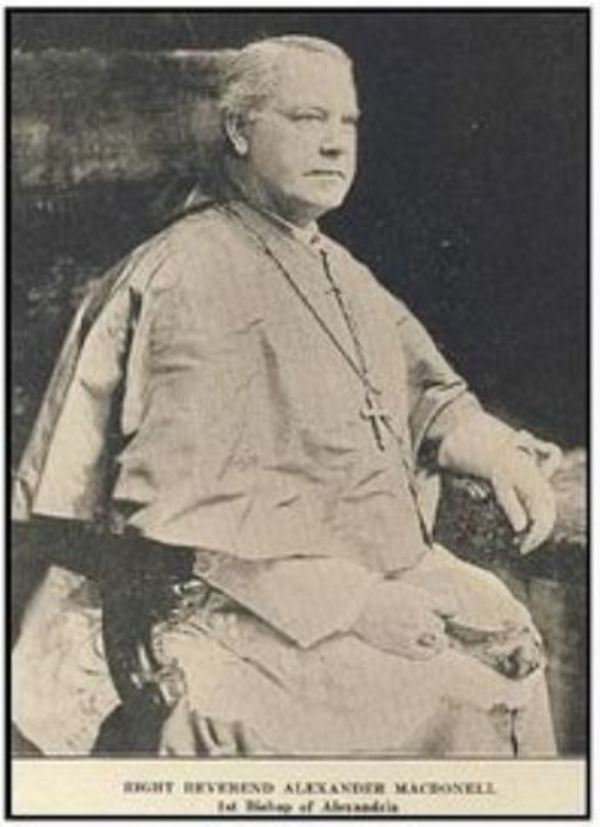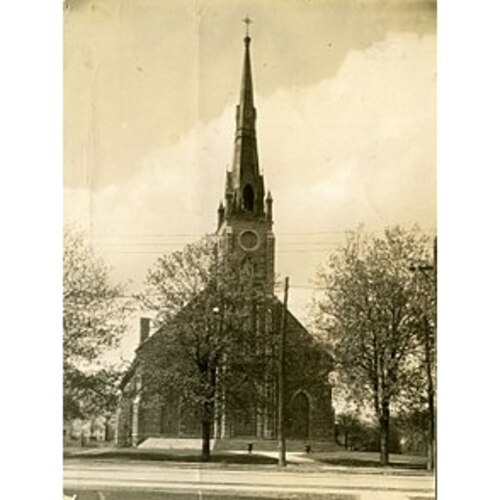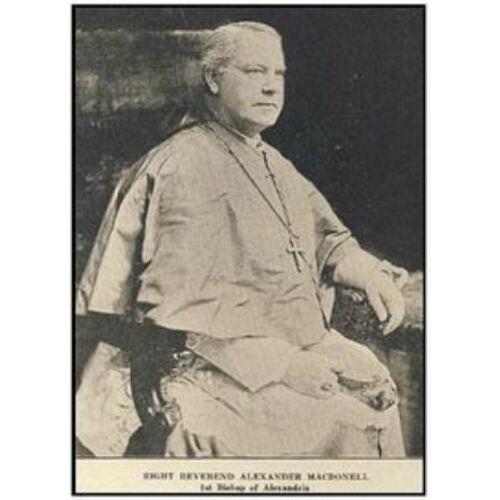
Source: Link
MACDONELL, ALEXANDER, Roman Catholic priest and bishop; b. 1 Nov. 1833 in Lochiel Township, Upper Canada, son of James McDonell, a farmer, and Christina Macdonald; d. 29 May 1905 in Montreal and was buried in Alexandria, Ont.
Alexander Macdonell was born into one of the oldest Scottish Catholic communities in British North America. His teenage, Gaelic-speaking parents had immigrated from Scotland to Glengarry County in the upper St Lawrence valley, settling in Lochiel about 1828. The devotion of the Glengarry Highlanders to the Catholic Church left an indelible impression on the young Alexander, the very namesake of the pioneer bishop Alexander McDonell*, who had helped build the settlement. Macdonell, who spoke English, French, and Gaelic, attended the local common school and in 1857 entered the College of Bytown in Ottawa [see Joseph-Henri Tabaret*]. After three years there he completed three years of theological training at Regiopolis College in Kingston. In December 1862 he was ordained priest and incardinated into the diocese of Kingston.
Macdonell had an uncontroversial career as a parish priest. He served as a curate in Gananoque for six months after his ordination and then moved, in June 1863, to his home parish, St Alexander’s in the community of Lochiel, where he served as pastor for 16 years. In 1879 he was transferred to St Finnan’s parish in Alexandria, a growing agricultural and railway centre. Here Macdonell became noted for his “business capacity” when he initiated the rebuilding of the parish church, which was completed in 1883 and nearly cleared of debt by 1890. His “keen judgement” and financial acumen contributed to his appointment as vicar general for the diocese of Kingston in September 1886.
Macdonell’s elevation to the episcopate in 1890 was the result of fierce episcopal battles in eastern Ontario. In 1886 Rome had responded to the petitions of the Quebec hierarchy and raised the diocese of Ottawa to an archiepiscopal see [see Joseph-Thomas Duhamel]. The French Canadian prelates hoped that this development would secure the diocese, which straddled the Ottawa River, from the expansionist ambitions of Ontario’s English-speaking Catholic bishops, who wanted the Ontario portion of the diocese more firmly under their control. In April 1889, responding to rumours that the counties of Stormont and Glengarry were to be added to the see of Ottawa, Bishop James Vincent Cleary* of Kingston led the Ontario bishops’ demand for a new “Scotch Diocese” in eastern Ontario. Eight months later, in January 1890, Rome created the diocese of Alexandria out of Stormont and Glengarry, suffragan to the new archiepiscopal see of Kingston. The well-established and thoroughly Scottish Macdonell appeared a natural choice for first bishop. Elevated on 18 July, he was consecrated on 28 October.
Using St Finnan’s parish as his episcopal seat, Macdonell presided over one of the smallest dioceses in the country: only 21,550 Catholics in 10 parishes served by 12 priests. On at least one occasion he petitioned Rome for an expansion of the diocesan boundaries because he could not raise sufficient funds for episcopal undertakings from his small flock. Despite Rome’s refusal, and notwithstanding only marginal increases in population, Macdonell supervised several successful building projects: the Hôtel Dieu Hospital and St Paul’s Home for the Aged Poor in Cornwall, the convent of the Sisters of the Holy Cross and the Seven Dolours in Alexandria, and a new episcopal palace.
Although the Catholic population of the diocese remained relatively static between 1891 and 1901, the French Canadian proportion increased by 27 per cent, largely owing to natural increase and the replacement of anglophone settlers by francophones. In 1892 Macdonell reiterated Archbishop Cleary’s decision to identify the parish of La Nativité in Cornwall “on the lines of language” rather than by “territorial limits.” Evidently there was no French Canadian pastor available for the parish, however, and in any case the bishop wished to avoid the nationalist sentiment that such an appointment might engender. Thus, much to the chagrin of the laity, La Nativité’s first pastors were born in France or were bilingual Celts. But in 1895 Macdonell addressed the longstanding petitions of francophones in the cathedral parish in Alexandria by asking Archbishop Édouard-Charles Fabre* of Montreal for a francophone curé to join his staff. The subsequent appointment of Father Joseph-Élie Poitras sparked a major debate between Macdonell and francophones over the establishment of a separate French-speaking parish in Alexandria. The bishop refused to grant the request, going so far as dismissing both Poitras and his successor when the petitions did not cease.
Periodic public displays of Protestant-Catholic ill will in Ontario in the 1890s and early 1900s, stimulated in part by the growth of French Canadian nationalism in its easternmost counties, came to focus on the language of instruction in schools. In this debate Macdonell pointedly expressed the concerns of many English-speaking Catholics. Sticking to the letter of Ontario’s school regulations, he refused to sanction French-language education in the separate schools within his diocese. In December 1901 P.-A. Huot and Alexandre Lalonde of Alexandria submitted a petition of 94 signatures to Macdonell, demanding that he establish a French separate school. The petitioners claimed that only training in French would preserve the French Canadian children’s “link” to their families, allow them to “understand the directions of their parents,” and enable them to “follow with benefit the religious teaching” given at church. Macdonell, however, was not moved. He saw such petitions as the product of nationalism and as an insult to the Scottish Catholic ratepayers who had founded the separate schools and who paid the lion’s share of the taxes. Macdonell openly believed that English was the language of the province and that French was “not essential for any purpose, socially, religiously nor communally, for the citizens of Ontario.” He advanced this point to apostolic delegate Diomede Falconio, to whom the French had appealed, and, conscious of the numerical superiority of anglophone Catholics in the diocese, he continued to limit separate schools to English-language instruction.
Macdonell was far less decisive in his handling of other diocesan problems, particularly those involving his priests. In 1897 he was reluctant to act when 480 laity petitioned for the removal of an “abusive” priest in Williamstown. Although between 1897 and 1902 a third of the congregation left the parish because of the priest and there were rumours of his having struck people, Macdonell did nothing. He mused that the pastor’s faults were “trivial.” He was similarly disinclined to act when Catholics in St Raphael’s parish complained in 1900 of the constant state of drunkenness of their priest. Macdonell’s reluctance to move the offender, because he feared the scandal would follow the priest in a small diocese, prolonged the scandal, and it was only after the apostolic delegate had intervened that the bishop took action, in the autumn of 1900. Macdonell’s inability to discipline clergy effectively, or at least appear to do so, hurt his relationship with some of his flock.
When the St Raphael’s and Williamstown cases had to be decided, Macdonell began suffering from “internal trouble.” After nearly three years of ill health, the bishop was admitted to the Hôtel-Dieu in Montreal, where he died in 1905 of complications probably arising from diabetes. His remains were removed to Alexandria and his bier was met by hundreds of Glengarrians, both Catholic and Protestant, who remembered the bishop as a “Good” and “esteemed” man of their Glengarry Scottish community.
AO, RG 22, ser.194, reg.N: 488–92. Arch. of the Archdiocese of Kingston, Ont., Alexander Macdonell, curriculum vitæ, 11 Aug. 1884. Arch. of the Diocese of Alexandria-Cornwall (Cornwall, Ont.), “Biography of Alexander MacDonell” (n.d.); George Corbet to Pietro Di Maria, 2 April 1925; “General history.” Arch. of the Roman Catholic Archdiocese of Toronto, L (Lynch papers), AD01.136. Archivio della Propaganda Fide (Rome), Scritture riferite nei Congressi, America settentrionale, 120: ff.323r–405v (report of the diocese of Alexandria, 16 Sept. 1895; copy in the Arch. of the Diocese of Alexandria-Cornwall, Corr. file, D 5/1/1); 146, 28 April, 8 June 1898. Archivio Segreto Vaticano (Rome), Delegazione apostolica del Canadà, 88, files 18, 36. NA, MG 29, D61: 5214. Catholic Record (London, Ont.), 17 June 1905. Catholic Register, 1, 8 June 1905. Freeholder (Cornwall), 31 Oct. 1890, 2 June 1905. Gazette (Montreal), 30 May 1905. Glengarrian (Alexandria, Ont.), 2 June 1905. Globe, 1 June 1905. La Presse, 29, 31 mai 1905. Le Canada ecclésiastique . . . (Montréal), 1891, 1905, 1907. Canadian annual rev. (Hopkins), 1905: 606. Canadian men and women of the time (Morgan; 1898). Canadian R.C. bishops, 1658-1979, comp. André Chapeau et al. (Ottawa, 1980). Robert Choquette, De la controverse à la concorde: l’Église d’Alexandria-Cornwall (Ottawa, 1990); L’Église catholique dans l’Ontario français du dix-neuvième siècle (Ottawa, 1984), 269–73. J.-A. Foisy, Le catholicisme en Ontario; quelques statistiques (Ottawa, 1918). Standard dict. of Canadian biog. (Roberts and Tunnell), vol.1.
Cite This Article
Mark McGowan, “MACDONELL, ALEXANDER (1833-1905),” in Dictionary of Canadian Biography, vol. 13, University of Toronto/Université Laval, 2003–, accessed December 19, 2025, https://www.biographi.ca/en/bio/macdonell_alexander_13E.html.
The citation above shows the format for footnotes and endnotes according to the Chicago manual of style (16th edition). Information to be used in other citation formats:
| Permalink: | https://www.biographi.ca/en/bio/macdonell_alexander_13E.html |
| Author of Article: | Mark McGowan |
| Title of Article: | MACDONELL, ALEXANDER (1833-1905) |
| Publication Name: | Dictionary of Canadian Biography, vol. 13 |
| Publisher: | University of Toronto/Université Laval |
| Year of publication: | 1994 |
| Year of revision: | 1994 |
| Access Date: | December 19, 2025 |




